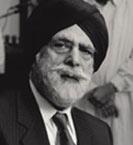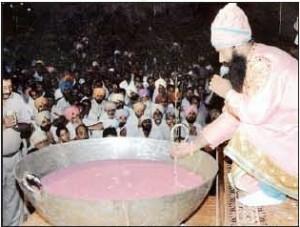Parliament of the World’s Religions | Salt lake City | 15 -10-15 | Plenary Speech | Lord Singh

Friends, its a pleasure and a privilege to be invited to address you at the opening of this historic Parliament. I would like to begin with a verse from the Sikh Guru Granth Sahib:
The Lord first created Light:
From the Lord’s play all living creatures came,
And from the same Divine Light all creation sprang.
Why then should we divide human creatures
Into the high and the low?
Brother, be not in error:
All Creation emanates from the one Creator
The Lord’s Spirit is all-pervading Spirit
Evident in all creation,
The Lord, the Maker, hath molded one mass of clay
Into vessels of diverse shapes.
Free from taint are all the vessels of clay
Since free from taint is the Divine Potter.
The allusion to the different vessels of clay and the one Divine Potter, reminds us that despite apparent differences, we are all equal members of our one human race.
This verse or shabad taken from the Sikh Holy Scriptures, the Guru Granth Sahib, in many ways encapsulates both the thrust of Sikh teachings and the central theme of this historic Parliament, in its emphasis on the absurdity of all man made distinctions of birth, class or creed. Other verses in the Guru Granth Sahib make clear that this equality also extends to full gender equality.
Sikhism is one of our different paths towards a summit of understanding of our common responsibility to the Creator, to work for the benefit of our fellow human beings. Sikhs believe our different paths are not mutually exclusive, but frequently merge to give us both a heightened understanding of our own faith and our common responsibilities.
Our Gurus emphasized respect for other ways of life in many different ways, Guru Arjan ,the fifth of our 10 founding Gurus incorporated some uplifting verses of Hindu and Muslim poets into the Guru Granth Sahib Sahib, including the one I’ve just read, to show that no one religion has a monopoly of truth and all faiths should be respected.
To promote this reaching out to others, the Guru asked a Muslim saint to lay the foundation stone of the historic Darbar Sahib at Amritsar, commonly known as the Golden Temple. In furthering the world’s first major move to interfaith understanding, the Guru placed a door at each of its four sides to signify a welcome to all from any spiritual or geographic direction. The 9th Guru, Guru, Guru Teg Bahadhur, took this further by giving his life defending the Hindu community’s right to freedom of worship against a policy of forced conversion by the then Mughal rulers. In doing so he gave practical utterance to Voltaire’s famous words: ‘I may not believe in what you say, but I will defend to the death your right to say it.’
I am delighted that this Parliament has set its goal as the reclaiming of our common humanity. It is a recognition that religion has largely failed to move minds to what Sikhs call a gurmukh or Godly direction, by making concern for others central to all we do. Instead of recognizing the common thrust of our different faiths, we have set barriers of belief between them smugly, and sometimes violently, proclaiming our superiority and exclusive path to God.
Our failure to give a clear ethical lead centered on compassion and concern for others, has led to a society obsessed in searching for contentment through material possessions, creating a selfish society in which the vulnerable suffer. Our common task is then to reclaim the heart of society by working together to create a more responsible society.
To be successful, we must boldly challenge what are becoming warped norms of putting self before others, and political agendas, both domestic and international before ethical concern for what Sikhs in our daily prayer, refer to as the well-being of all humanity. If we do this, we are bound to be successful in reclaiming the heart of humanity.
Thank you.




